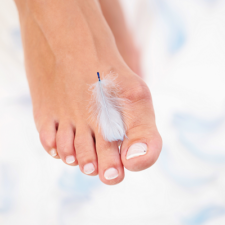
Bunions are deformities of big toes. They are considered to be a typically feminine condition, however men also have them.

Bunions are deformities of big toes. They are considered to be a typically feminine condition, however men also have them.
. In a healthy foot the big toe is placed in parallel to other toes. When pressure is applied by shoe toes or sides, they are bent inwards and to the side. They are caused by relaxation of foot muscles and joints (it may be inherent or temporary, for example during pregnancy), but to a large extent by wearing high heels. Such shoes make that the forefoot is overloaded, which places the metatarsal bone in a fan-like position, and narrow shoe toes put pressure to big toes causing deformity. Bunion formation is promoted by many hours of standing position, especially in overweight patients. Genes also play an important role.
First worrying signs are frequent forefoot pains, sole burning and callus formation. These complaints are the result of changed foot functioning – the big toe is not a sufficient support any more. Until these lesions are not important, and joint deformity slightly visible, there is a chance of stopping the process without surgical intervention.
Fighting bunions should start with changing shoes – replace stiletto shoes with flats with wide toes, where the foot will not be squeezed. You should also use different types of cushions, devices and protections that mechanically correct the placement of the big toe. Some of them are worn in shoes, and some are put overnight – they are available in some drugstores and rehabilitation shops. You may also practise feet (e.g. tiptoeing) to fortify muscles and ligaments.
A deformed joint may return to the correct shape only by surgery. After the surgery, the foot needs to be immobilised in the plaster. Because this condition looks bad and also hurts and disables walking, it is worth taking care of your feet and prevent bunion formation to avoid surgical intervention and a long rehabilitation.